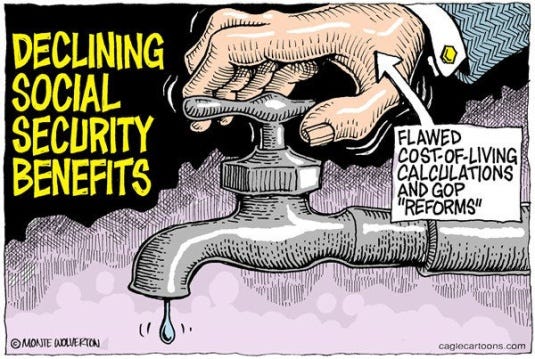Given the new GOP majority in the House, there’s a lot of talk these days about the debt ceiling and how, if possible, changes to Social Security might fit into the discussion. Speaker McCarthy and President Biden both say Social Security is off the table, but you and I know things can change. With this last thought in mind, I hope you’ll find the column I wrote 9 years ago of interest. Here’s my piece from the February 13, 2014 edition of the Orange County Register.
Denny Freidenrich: A new Social Security formula
Nationally syndicated columnist Robert J. Samuelson’s latest piece about seniors and Social Security truly offers up food for thought [“Figuring the true financial condition of the elderly”]. I’m guessing that, over the years, Samuelson has written about this topic a hundred times. I’m relatively new, but here are my thoughts:
Assume for a minute that the average 66-year-old retiree receives a monthly check of $1,250. That’s $15,000 a year. Second, assume this same retiree doesn’t exceed the annual earnings limit and lives to be 76. Minus any cost of living increases, this equals $150,000 in benefits paid by Social Security over a ten-year period.
My formula spends more up-front, but saves the system billions of dollars on the back end. How? By offering the retiree a one-time, lump-sum payment of five times his or her annual benefit (based on a calculation that factors in the discounted value of future payments against one’s projected life span).
For the purposes of discussion, that’s a $75,000 check paid to the above-mentioned beneficiary on Day 1 of his or her retirement. That’s it. From my perspective, Social Security has met its obligation to the retiree … he or she receives a comfortable amount of money all at once … and, assuming the retiree lives longer than five years beyond his or her start date, Social Security saves billions in monthly payments. It’s a classic win-win, no?
Before any CPAs or policy wonks throw their calculators at me, there’s one more thing: I suggest making my pay-out program voluntary. This way, people have a choice. Retirees can roll the dice on their life expectancy (i.e., be aggressive) and take a risk on an amount all at once, or they can play it more conservatively and agree to receive their monthly Social Security checks, perhaps well into their 80s or 90s.
Not counting survivors, dependents or the disabled, the number of seniors on Social Security is more than 37 million now – and growing daily. This number is expected to double in the next twenty years. My formula is based on simple mathematics, not political ideology. If my numbers don’t add up, then tell me. My plan tries to balance the needs of current and future Social Security retirees against the backdrop of an aging, ailing system. If my priorities are out of whack, then let me know that, too.
Virtually everyone, including writer Samuelson, agrees that something needs to be done to “fix” Social Security. Trouble is that most ideas floated in Washington are shot down by partisan opponents before they ever get off the ground.
My hope is this formula stirs the imagination of Democrats, Republicans and Independents alike. Take a breath and ask yourself this one, simple question: Which would you prefer? A one-time, lump-sum payment on the first day or your retirement or monthly checks deposited into your bank account? Better yet, which option do you think American retirees will want?
Here’s hoping Mr. Samuelson finds my idea interesting enough to comment on in the future.
Denny Freidenrich writes from Laguna Beach. A former congressional staff assistant, he has lived in Orange County since 1970.




I prematurely released my comment with my jittery new iPad. I will try to replicate what I said. Please ignore it if my answer got posted as I cannot find it.
Basically, I am not in favor of buy-outs because they usually are not an advantage to the retiree. They most often do not adequately provide for inflation or longevity. Unfortunately a lump sum usually is very attractive, especially to someone to whom it appears a large sum of money. But it hardly ever amounts to the same sum that the retiree would get if he/ she took the monthly payments. The latter usually amount s to and often exceeds the buy-out. Monthly sums usually are better too, for people who are not necessarily good money managers. I saw it in action. My stepfather took a lump sum buy out because my family urged him to do so. I urged him not to. Well, he was not a good planner nor was he used to a fairly large ( but not sufficiently) sum. He went through the money in a short time. And there are another few chapters about the family strife that this decision brought.
I too, was offered a buy-out when I was 55 and was tempted for a short time to take it. It is a slightly different scenario because I was not yet retired. I am so much better off for not having taken it because my retirement amount was increasing each year that I worked. As I said( now 3 times if you got my other email) things that seem too good to be true, often are.
Now, what might work, is getting those in Congress to take a lump sum proportionate to what they would pay other retirees. And at the same time, get them to give up their lifetime health benefits.
That would encourage all of them to support Medicare.